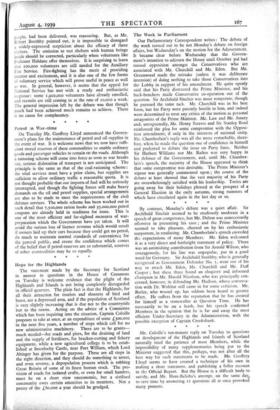The Week in Parliament Our Parliamentary Correspondent writes : The
debate of the week turned out to be not Monday's debate on foreign affairs, but Wednesday's on the motion for the Adjournment. It became dear before Wednesday that the Govern- ment's intention to adjourn the House until October 3rd had roused opposition amongst the Conservatives who are associated with Mr. Churchill and Mr. Eden. But Mr. Greenwood made the mistake (unless it was deliberate intention) of doing nothing to take those Conservatives into the Lobby in support of his amendment. He quite openly said that his Party distrusted the Prime Minister, and his back-benchers made Conservative co-operation out of the question. Sir Archibald Sinclair was more temperate, though he pursued the same tack. Mr. Churchill was in his best form, but his Party were patently hostile to him, and indeed were determined to treat any critics of the motion as personal antagonists of the Prime Minister. Mr. Law and Mr. Amery and, unexpectedly, Mr. Henry Strauss and Sir Stanley Reed reinforced the plea for some compromise with the Opposi- tion amendment, if only in the interests of national unity. Mr. Chamberlain's reply was all the more remarkable, there- fore, when he made the question one of confidence in himself and preferred to debate the issue on Party lines. Neither Sir Herbert Williams nor Mr. Raikes was very happy in his defence of the Government, and, until Mr. Chamber- lain's speech, the majority of the House appeared to think that some compromise was desirable. The Prime Minister's vigour was generally commented upon ; the course of the debate at least showed that the vast majority of his Party are overwhelmingly satisfied with his leadership. Tories are going away for their holidays pleased at the prospect of a General Election in the early autumn, strong rumours of which have circulated again in the last day or so.
* * * *








































 Previous page
Previous page